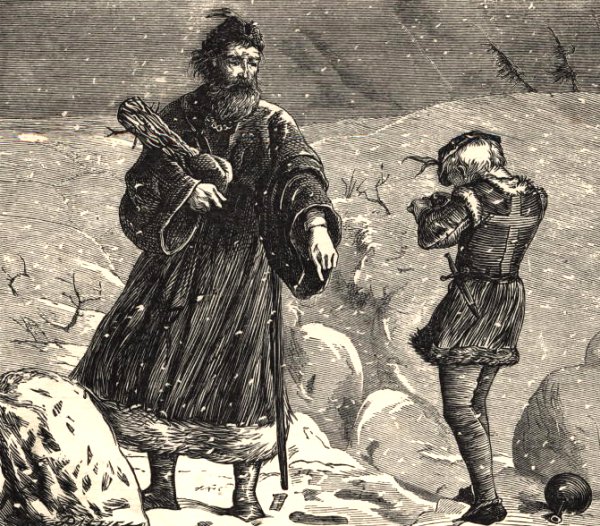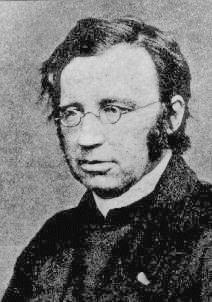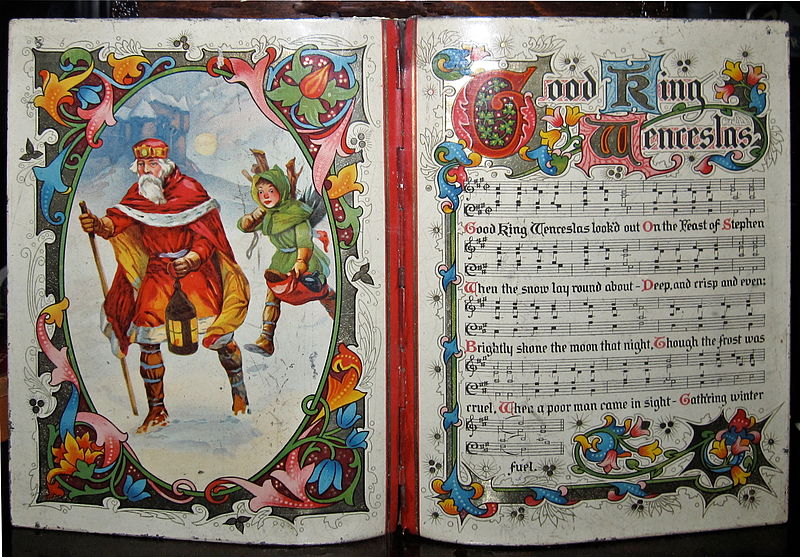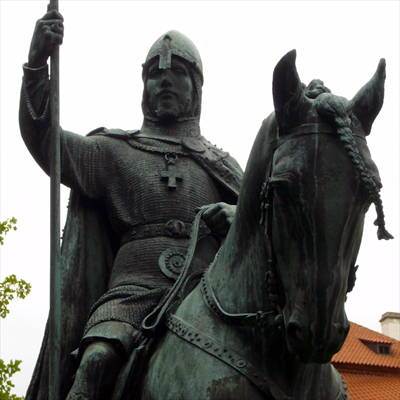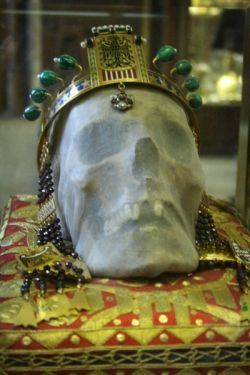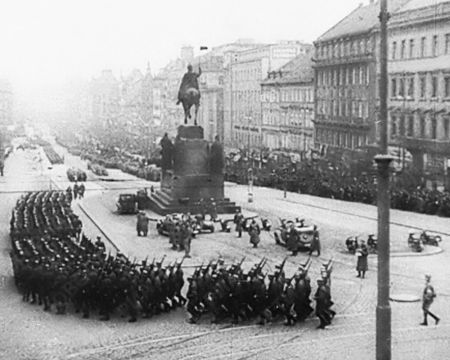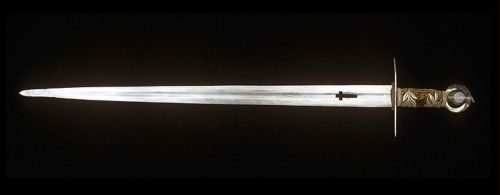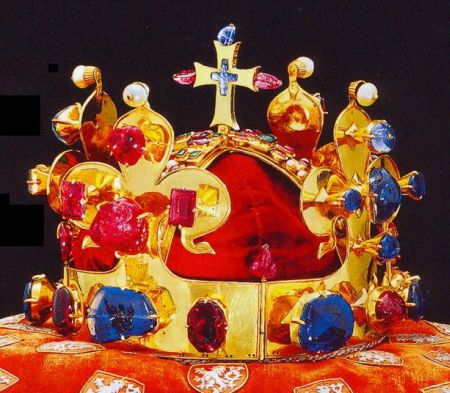‘Hither, page, and stand by me…Mark my footsteps, tread now in them boldly, you shall find the winter’s rage freeze your blood less coldly.’How Wenceslas Became The Good King
"Good King Wenceslas" tells a story of Good King Wenceslas braving harsh winter weather to give alms to a poor peasant on the Feast of Stephen (the second day of Christmas, December 26). During the journey, his page is about to give up the struggle against the cold weather, but is enabled to continue by following the king's footprints, step for step, through the deep snow. The legend is based on the life of the historical Saint Wenceslaus I, Duke of Bohemia (907–935). The Czech form of the name is (Svatý) Václav.
In 1853, English hymnwriter John
Mason Neale wrote the "Wenceslas"
lyrics, in collaboration with his
music editor Thomas Helmore, and
the carol first appeared in Carols for
Christmas-Tide, 1853. Neales' lyrics
were set to a tune based on a 13th
century spring carol, "Tempus adest
floridum" ("The time is near for
flowering") first published in the
1582 Finnish song collection Piae
Cantiones.
‘Good King Wenceslas,’ Bing Crosby, Kraft Music Hall live radio broadcast, 1944. The female vocalist on the track has been identified as Rosemary Clooney, but this recording was made a year before Clooney first appeared on record.King Wenceslas (or Wenceslaus) was the Duke of Bohemia in the years 921-935. He is now patron Saint of the Czech Republic and is statue stands Wenceslaus Square in Prague. His feast day is September 28.
The chronicler Cosmas of Prague, writing circa 1119, describes the King’s transformative experience thusly:
Rising every night from his noble bed, with bare feet and only one chamberlain, he went around to God’s churches and gave alms generously to widows, orphans, those in prison and afflicted by every difficulty, so much so that he was considered, not a prince, but the father of all the wretched.
The episode involving the pagan woman is a bit fanciful, by the way, and not history--although it was a time of conflict between Christians and pagans. The Duke’s mother, Drahomíra, was the daughter of a pagan tribal chief of Havolans and was baptised at the time of her marriage.
On Christmas day as was his custom, on this special day every year, Duke Wenceslas visited each of the servants and soldiers in his castle, and pressed a gold coin into his or her hand.
The Duke walked through the cold stone passageways in the lower depths of his castle. As he stepped kitchen through the door, a fierce heat struck his face, and the smell of roast meat filled his nostrils. Two servants were turning swans on a giant spit over the fire. Elsewhere men and women, young and old, were busy with fetching, rolling, shouting, stuffing, stirring, scouring, scraping, and all the other tasks of the kitchen. Those who saw him enter stopped their work and bowed deeply. His page called out:
“Line up, line up for the Duke.”
And the kitchen staff scuffled around arranging themselves in order of rank, from the head cook to the young scullery maid who was just eleven years old.
Each of the servants received gold coin from the hand of their ruler with the words: “May the Lord Jesus Christ, our Savior who was born on this day, bless you and watch over you.”
After the kitchen, the Duke proceeded to the guard house, and then to laundry, and then to maids of the bed chambers, and then to the stables. Last of all, he visited the dungeons. The jailers received his blessings and gold, and the prisoners received just his blessings.
Good King Wenceslas on a biscuit tin, made by Hudson, Scott & Sons for Huntley & Palmers, 1913He spoke last to an old woman prisoner:
“May the Lord Jesus Christ, our Savior who was born on this day, bless you and watch over you.”
He looked into the woman’s eyes and saw that they were piercing blue. She must have been quite a beauty in her youth. He felt sorry that her life and folly had brought her to this dark prison cell on Christmas Day.
“What is her crime?” he asked the Jailer.
“My Lord, she is a priestess of the old school. She performed pagan rites and lead the people in the worship of false gods.
At this Duke Wenceslas said sadly:
“Tis a pity. Had she been guilty of a lesser crime…. had she been guilty of even murder, I would have set her free to go home and to die in her bed among her family.” And then he turned to the old woman:
“Do you not see now how the Christian religion teaches mercy and kindness? This Christmas Day I have pressed gold into the hands of the lowliest servant in my castle. Are you not impressed by my good works in the name of Jesus Christ? Do you not renounce the devil and your gods and come to the true Savior? Only say the words ‘I do’ and you shall be rid of your chains this Christmas Day.”
‘Good King Wenceslas,’ The Irish Rovers, from the group’s 2005 album, Songs of ChristmasAnd the priestess lifted her gray head and fixed the Duke with her blue eyes:
“The scummiest jailer in your castle is a lord in comparison to peasants outside. You have no idea what it means to live in a hovel, to freeze in depths of winter, to have rags for clothes and a few sticks for a fire. Throw coins to your groveling servants if it makes you feel good before you stuff yourself with rich food. But don’t talk to me of your false charity.”
As it was Christmas Day, the Duke did not order the woman to be whipped. He just shook his head at her insolence and her missed chance of freedom.
But as he climbed the winding stone stair back to the lighter world of his busy castle, her words were turning in his heart. And when he saw his servants going about their work, briskly, but smiling, he thought, Yes, you are the lucky few.
Now unsatisfied with his Christmas routine, he ordered his servant to bring him his fur-lined cloak, boots, gloves and hat. Another servant strapped a sword to his side. The head stable boy brought his horse out into the courtyard and placed a small ladder against its side. Snow was already flecking the Duke’s beard as he stood and waited for all to be ready. And then he clambered onto his mount and rode through the gates of the castle followed by just a page on a gray mare.
Saint Wenceslas, Duke of Bohemia, The Good King“Boy,” he called back to the page, ”were you born in a village?”
“Oh no sire. I was born in the castle,” replied the boy.
“Do you have any relatives in a village?”
“Oh yes sire. My grandmother lives in a village not far from here.”
“Well take me there.” said the Duke.
And when they arrived in village, they found the boy’s grandmother at the drinking well, known as the fount of St. Agnes. She was using a long pole--a branch broken off a birch tree – and ramming it down into the well to break the ice.
“Here, give the good lady some gold,” said the duke. Which the page gladly did. At this, the other peasants of the village, who until now had been plodding through the snow on their business, came rushing over from all sides to beg the Duke for money.
“Back Back!” cried the page boy. The Duke took a handful of coins and scattered them on the ground. The peasants dived on them like a flock of birds on some crumbs of bread.
The Duke returned to the castle to resume his Christmas worship and festivities, but instead of feeling better for his generosity, he somehow felt troubled by it. As he celebrated the last Christmas of the millennium, the image of the priestess in the dungeon was always in his mind.
The next day--the feast day of St. Stephen--there was boxing and jousting in the tiltyard. Music, dancing and merrymaking continued throughout the afternoon and evening. But the Duke’s heart was still not fully in the celebrations. He stood up from his place in the banqueting hall, and went up onto the ramparts of the castle to take in the cold fresh air. It was a clear moonlit night. He looked out towards the village that he had visited the day before. He saw a peasant wandering across the fields, bending down every now and then to picked up sticks for the fire.
“Page, Page!” he called out--for his attendant was never far away--bring me food from from the table, the best bits, and bring wine, and fetch some logs for the fire. I intend to go out and give these things to that man--hurry hurry now. I shall wait for you by the gates of the castle.”
The skull of Saint Wenceslas with Premyslid EagleThe Duke took the winding stairs down to the courtyard. Servants brought him his fur-lined clothes and boots--“No No,” he said. “I shall go without them.” And instead he took off his shoes and stood on the snow covered cobble stones. His feet were entwined in woolen strips--but that was their only covering.
The stable boy stood by with the Duke’s horse.
“Follow me,” the Duke said to the page, “We are going on foot.” And seeing that that his master was not wearing a coat or hat, the poor page felt that disrespectful as he put on his own clothes--but the master did not seem to take notice.
The Duke and the boy, walked out through the gates of the castle, their arms filled with gifts. The servants shook their heads, convinced that not only had their Duke gone mad, but that he would catch his death of cold.
The peasant was heading for the village, and the Duke and the boy hurried after him. The Duke’s almost bare feet sank deep into the snow, but he did not seem to notice the cold. He strode on, propelled by some sort of super-human strength. The poor page boy felt the chill coming up through the soles of his boot and through his whole body. The wind cut into his face and he rubbed his nose to stave off frostbite.
“Sire, Sire,” he called out. “My strength is failing me.”
German occupation army, 1939, under the statue of WenceslasAt first the Duke did not hear him. Only when the boy called out: “I cannot go on.” did he halt his progress across the snow. He turned round and saw the boy had fallen to his knees.
Duke Wenceslaus looked back to the castle. Although the night had grown darker, he could clearly see his footsteps all the way back. They were luminous like the moon.
“Good boy,” he said. “Stand up and place your feet in my footsteps.
And page, who was used to obeying his Duke’s every command, gathered his strength and rose to his feet.
“Here, here,” said the Duke. “This is my step. Place your foot on top of it.”
And the boy, seeing the pale blue glowing footsteps, placed his foot on the spot where the Duke’s foot and sunk into the snow. Then he lifted his other foot and placed it in the footstep behind. Instead of cold, he felt warmth and energy rising through his body. The Duke carried on ahead, and the boy, followed behind, now feeling as full of life and energy as if he was striding across a meadow full of lambs one day in spring.
The Duke and the page caught up with the man just before he reached his village. They gave him their gifts, for which he thanked and blessed them. And on his return to the castle, the Duke set the pagan priestess free from the jail.
Sword of Saint WenceslasPostscript: In September of 935 or 929, a group of bodyguards and nobles Wenceslas’ younger brother, Boleslav, murdered the Duke. After inviting his brother to the feast of Saints Cosmas and Damian, he murdered him on his way to church and thus succeeded him as the Prince of Bohemia. (Note the title Prince, indicating independence from the Catholic Holy Roman Empire, as opposed to Duke, the title granted by the Empire to Wenceslas.) The actual murder was purported as being hacked to death at the door of the church in the town now called Stara Boleslav. Boleslav become Wenceslas’ successor to the throne.
A modern Czech historian claims the death of Wenceslas was an accident caused during a skirmish between bodyguards of both brothers and Boleslav was not guilty of murder.
Crown of Saint WenceslasAlthough Wenceslas was, during his lifetime, only a duke, Holy Roman Emperor Otto I posthumously “conferred on Wenceslas the regal dignity and title”, and that is why, in the legend and song, he is referred to as a “king.”
Wenceslas was considered a martyr and a saint immediately after his death, when a cult of Wenceslas grew up in Bohemia and in England. Within a few decades of Wenceslas’s death four biographies of him were in circulation. These hagiographies had a powerful influence on the High Middle Ages conceptualization of the rex justus, or “righteous king”—that is, a monarch whose power stems mainly from his great piety, as well as from his princely vigor. Hence, Wenceslas was known in places as far away as Britain and France, where his Arthur-like traits promoted his popularity. His legend even predicts that, like Arthur, he will return with his great sword and defend the land against invaders.
(Sources: Storynory.com, Swords and Armor)
Founder/Publisher/Editor: David McGee
Contributing Editors: Billy Altman, Laura Fissinger, Christopher Hill, Derk Richardson
Logo Design: John Mendelsohn (www.johnmendelsohn.com)
Website Design: Kieran McGee (www.kieranmcgee.com)
Staff Photographers: Audrey Harrod (Louisville, KY; www.flickr.com/audreyharrod), Alicia Zappier (New York)
E-mail: thebluegrassspecial@gmail.com
Mailing Address: David McGee, 201 W. 85 St.—5B, New York, NY 10024


